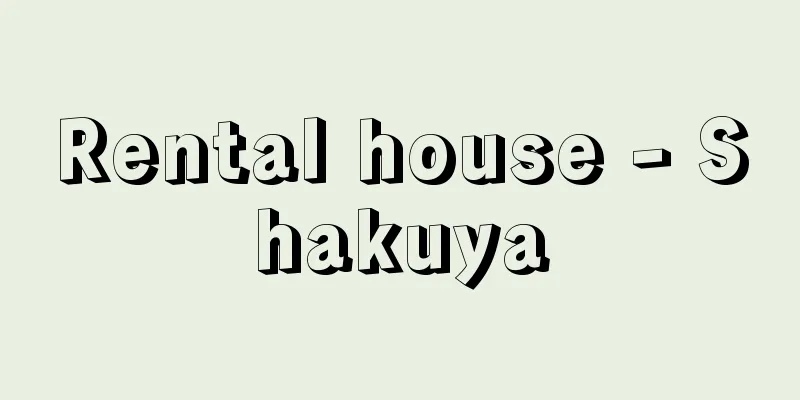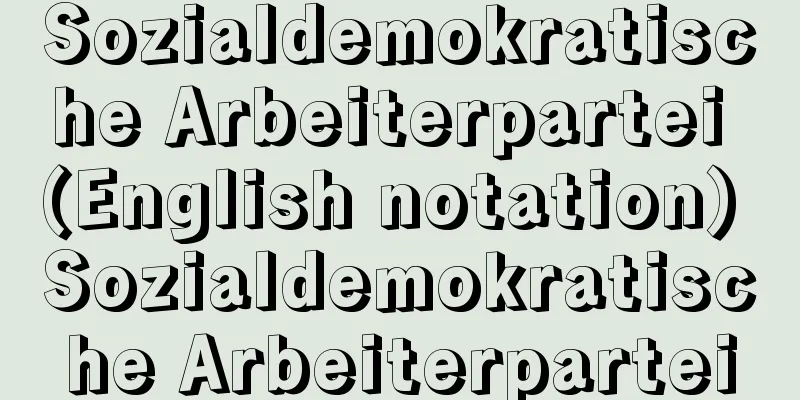Rental house - Shakuya

|
It refers to renting a house owned by someone else by paying rent, or the house of another person that is rented in this way. [Takahisa Awaji] How to rent a houseIn order to rent someone else's house, it is normal to enter into a lease contract as a credit contract (Civil Code Article 601 et seq.), but it is also possible to enter into a contract to use someone else's house free of charge (loan for use) (Civil Code Article 593 et seq.). However, the latter is rare in practice, and lease contracts are the norm. [Takahisa Awaji] Rental LawA rental contract is classified as a lease contract under the Civil Code, except in rare cases of lease for use. When such a rental contract is concluded, the tenant acquires the right to lease the property, but because the right to lease is a claim and the provisions on rental contracts in the Civil Code are based on the principle of freedom of contract (the landlord, who is the de facto powerful party, has a legally advantageous position), the legal protection of the right to lease the property was extremely insufficient. In order to protect such tenants, the House and Land Lease Law was enacted in 1921 (Taisho 10). After that, in response to changes in social and economic activities, there was an increasing demand to make the land and house lease system easier to use, and the Land and House Lease Law was enacted in 1991 (Heisei 3) and came into effect on August 1, 1992. As a result, the House and Land Lease Law was abolished, but the effect of the provisions of the House and Land Lease Law before the abolition was not affected, and the old law still applies to certain matters regarding rentals made before the new law came into effect. [Takahisa Awaji] Legal relations regarding renting and protection of rent rights
According to the Civil Code, when the term of a tenancy expires, renewal is not compulsory. In addition, in the case of a tenancy contract with no fixed term, the parties may request termination at any time (see above). However, this is extremely disadvantageous to the tenant. Therefore, the old House Rental Act sought to protect tenants by stating that the lessor (landlord) may not refuse to renew the lease or request termination unless there is a legitimate reason (House Rental Act, Article 1-2), and there was an accumulation of precedents stating that the presence or absence of a legitimate reason in this case is to be determined by comparing the interests of both the landlord and the tenant. Based on these provisions of the House and Land Lease Law and the accumulation of precedents, the House and Land Lease Law provides that the lessor may not refuse renewal or request termination unless there is a justifiable reason, taking into consideration the circumstances of the lessor and the lessee needing the use of the building, the previous history of the building lease, the usage status of the building, the current state of the building, and the lessor's offer to pay financial benefits (so-called eviction compensation) to the lessee (Article 28). The first item, the circumstances of both parties needing the building, is the basic element, and the second and subsequent items are considered supplementary elements. Next, if the parties determine the lease period, and the party does not notify the other party of refusal to renew or not to renew unless the conditions are changed within six months to one year before the expiration of the period, it is deemed that a new contract has been made with the same conditions as the previous lease at the time of expiration (Land and House Lease Law, Article 26, Paragraph 1, House and Land Lease Law, Article 2, Paragraph 1). Furthermore, even if the above-mentioned notice has been given, if the landlord does not promptly object to the tenant's continued use of the building, the contract will also be renewed (Land and House Lease Law, Article 26, Paragraph 2; House and Land Lease Law, Article 2, Paragraph 2). (2) Perfectability of a leasehold right A leasehold right as a lease is a claim. Therefore, except in cases where the landlord has kindly registered the leasehold right (see Article 605 of the Civil Code), there is no right to demand registration from the landlord. Therefore, for example, if the landlord transfers the rental premises to a third party, the tenant should not be able to assert his/her leasehold right against this third party. However, this would be extremely detrimental to the tenant. Therefore, the old House and Land Lease Law sought to protect the tenant by making the delivery of the building a perfect requirement (Article 1, Paragraph 1 of the House and Land Lease Law), and the Land and House Lease Law inherited this (Article 31, Paragraph 1). As a result, even if the building lease is not registered, if the building is delivered, it will be effective against those who acquire real rights (for example, ownership) in the building thereafter. (3) Rent and the right to request an increase or decrease in rent The amount of rent (house rent) is determined by agreement between the parties. The timing of payment of rent is determined by agreement between the parties, but in principle, it is paid in arrears (Civil Code Article 614). In principle, once the amount of rent is agreed upon, it will remain the same. However, since a rental contract is a continuing contract, the rent often becomes inappropriate over time. Therefore, the old House and Land Lease Law recognized the right to request an increase or decrease in rent (Article 7, Paragraph 1 of the House and Land Lease Law), and the Land and House Lease Law inherited this (Article 32, Paragraph 1). In other words, when the rent becomes inappropriate due to an increase or decrease in taxes or other burdens on the land or building, due to fluctuations in the price of the land or building or other economic circumstances, or compared to the rent of similar buildings in the vicinity, the parties can request an increase or decrease in the rent for the future, regardless of the terms of the contract. However, if there is a special agreement not to increase the rent for a certain period of time, this shall be followed (same proviso). If the parties cannot reach an agreement on the amount of the increase or decrease in rent, they may pay an amount that they consider reasonable (for example, the amount that has been paid up until now) until the court decision is finalized. However, the shortfall must be paid later with 10% interest per year (Article 32, Paragraphs 2 and 3 of the House and Land Lease Law). Therefore, the contract cannot be terminated for the reason that the amount is too small. Furthermore, when renting a house, it is normal to be required to pay a key money and a security deposit. The nature of the key money can vary, but the most important cases are when it acts as an advance payment of rent, when it is paid as consideration for business profits, when it acknowledges the transferability of the leasehold, etc. The security deposit acts as a security. Therefore, when the contract ends and the tenant has no remaining debts, the security deposit will be returned. (4) Landlord's Obligation to Make Repairs The landlord is obligated to make repairs necessary for the use and profit from the rented premises (for example, repairs to walls and roofs) (Civil Code, Article 606, Paragraph 1), and the tenant cannot refuse the landlord's request to carry out acts necessary for the preservation of the rented premises (for example, repairs to the foundations and roof) (Civil Code, Paragraph 2). (5) Transfer and subleasing of rental rights There is no freedom of transfer or subleasing of rental rights. In other words, a tenant cannot transfer or subleasing a rental right without the landlord's consent (Civil Code, Article 612, Paragraph 1), and if a tenant violates this by allowing a third party to use and profit from the rental property, the landlord will have the right to terminate the contract (Civil Code, Paragraph 2). However, for example, letting a relative live with the tenant or letting a student live as a temporary lodger is not considered an unauthorized subleasing that is a reason for terminating the contract. According to case law, unauthorized transfer or subleasing will be deemed a right to terminate the contract if it is to the extent that it destroys the trust that is the basis of the rental relationship. (6) Right to demand purchase of fixtures When a lease contract ends, a tenant can demand that the landlord purchase the fixtures (Land and House Lease Law, Article 33; House and House Lease Law, Article 5). However, the fixtures that are the subject of the demand for purchase must be tatami mats, fixtures, and other fixtures that were added to the building with the landlord's consent. The purchase price is the current market price. Unlike the old House and Land Lease Law, this right to demand purchase of fixtures is an optional provision under the Land and House Lease Law (the landlord can stipulate in the lease contract that he/she will not purchase the fixtures when the contract ends). It is understood that the right to demand purchase of fixtures does not arise if the contract is terminated due to the tenant's default on the debt. (7) Inheritance of the lease by a de facto spouse or adoptive parent/child If a tenant dies while living with his/her common-law wife, the common-law wife has no right of inheritance and must vacate the rented property. This puts the common-law wife at a great disadvantage. Therefore, measures are in place to protect these people. In other words, a tenant's de facto spouse (e.g., common-law wife) or adoptive parent/child may inherit the rights and obligations of a tenant who dies without an heir while living with the tenant (this does not apply if the cohabitant expresses an opposing opinion to the lessor within one month) (Land and House Lease Law, Article 36; House and Land Lease Law, Article 7-2). (8) Fixed-term building leases The Land and House Lease Law provides for two cases of building leases that do not have renewal contracts. One is a fixed-term lease, which was introduced by amending Article 38 of the Land and House Lease Law under the Special Measures Law for Promoting the Supply of Quality Rental Housing, etc. (commonly known as the Fixed-term House Lease Law). In other words, when leasing a building with a fixed term, it is possible to stipulate that the contract will not be renewed only when the contract is made in writing, such as by notarized deed (Land and House Lease Law, Article 38, Paragraph 1). When entering into such a fixed-term lease contract, the landlord must explain to the tenant in advance in writing that the contract will not be renewed and the lease will end at the expiration of the term (paragraph 2 of the same law), and if the landlord does not explain, the provision that the contract will not be renewed is invalid (paragraph 3 of the same law). The other is a lease of a building scheduled for demolition. In other words, if it is clear that the building must be demolished after a certain period of time due to law or contract, a written document stating the reasons for the building to be demolished can stipulate that the lease will end when the building is demolished (Land and House Lease Act, Article 39, Paragraphs 1 and 2). (9) Temporary Use Exceptions The provisions regarding renting in the Land and House Lease Law do not apply, as an exception, when it is clear that the rental contract has been concluded for temporary use (Land and House Lease Law, Article 40; House Lease Law, Article 8). [Takahisa Awaji] "New Edition Annotated Civil Code (15) Supplement" edited by Hironaka Toshio (1993, Yuhikaku)" ▽ "Case Studies on Land and House Leases by Uchida Katsuichi et al. (1996, Yuhikaku)" ▽ "Theory and Practice of Land and House Lease Law" edited by Sawano Yoshihiko et al. (1997, Yuhikaku)" ▽ "Fixed-Term Tenancy by Abe Yasutaka (1998, Shinzansha Publishing)" ▽ "New Lectures on Land and House Lease Law, Vols. 1-3 by Inaba Takeo (1998, 1999, Nippon Hyoronsha)" ▽ "Explanation of the Fixed-Term House Lease Law and Legal Practice by Hirata Atsushi (1999, Gyosei)" [Reference] | | | | | | |Source: Shogakukan Encyclopedia Nipponica About Encyclopedia Nipponica Information | Legend |
|
他人の所有する家屋を賃料を支払って借りること、あるいはこのようにして借りた他人の家屋をいう。 [淡路剛久] 借家の方法他人の家屋を借りるには、債権契約としての賃貸借契約(民法601条以下)を結ぶのが普通であるが、無償で他人の家屋を使用する契約(使用貸借)を結ぶこと(同法593条以下)も可能である。しかし後者は実際上まれであり、賃貸借契約がほとんどである。 [淡路剛久] 借家に関する法律借家契約は、まれな使用貸借の場合を除き、民法の賃貸借契約に属する。そして、このようなものとしての借家契約が結ばれると、借家人は賃借権を取得することになるわけであるが、賃借権は債権であり、かつ、民法の賃貸借契約に関する規定は契約自由の原則のうえにたつために(事実上の強者たる家主が法的にも有利な地位を占める)、その法的保護は甚だ不十分なものであった。そこで、このような借家人の保護を図るため、1921年(大正10)借家法が制定された。その後、社会・経済事業の変化に応じて、借地、借家制度をより利用しやすい制度にすべきであるとの要請が高まり、1991年(平成3)に借地借家法が制定され、1992年8月1日から施行された。これにより借家法は廃止されたが、廃止前の借家法の規定により生じた効力を妨げないほか、新法施行前にされた借家については、一定の事項についてはなお旧法が適用されるものとされている。 [淡路剛久] 借家に関する法律関係と借家権の保護
借家権の存続期間が満了したとき、民法によれば更新が強制されることはない。また期間の定めのない借家契約の場合には、当事者はいつでも解約の申入れをなすことができる(前述)。しかし、これでは借家人の不利益が甚だしい。そこで旧借家法は、正当事由がある場合でなければ、賃貸人(家主)は賃貸借の更新を拒み、または解約の申入れをなすことができない(借家法1条ノ2)、として借家人の保護を図り、この場合の正当事由の有無については、家主および借家人の双方の利益を比べて決せられるものとする判例が積み重ねられた。このような借家法の規定と判例の蓄積を踏まえて、借地借家法は、建物の賃貸人および賃借人が建物の使用を必要とする事情のほか、建物の賃貸借に関する従前の経過、建物の利用状況および建物の現況ならびに建物の賃貸人が賃借人に財産上の給付(いわゆる立退料)をする旨を申し出た場合のその申出を考慮して正当の事由があると認められる場合でなければ、賃貸人は、更新拒絶または解約の申入れをすることができない、と規定した(28条)。第1の建物を必要とする両当事者の事情が基本的要素であり、第2以下の事情は補充的要素と解されている。次に、当事者が賃貸借の期間を定めた場合において、当事者が期間満了前6か月ないし1年間に相手方に対して更新拒絶の通知、または条件を変更するのでなければ更新しない旨の通知をしないときには、期間満了の際従来の賃貸借と同一の条件をもってさらに契約をなしたものとみなされる(借地借家法26条1項、借家法2条1項)。また、前述の通知をした場合であっても、借家人が建物の利用を継続しているのに対して家主が遅滞なく異議を述べなければ、同じく契約は更新される(借地借家法26条2項、借家法2条2項)。 (2)借家権の対抗力 賃借権としての借家権は債権である。したがって、家主が好意で賃借権の登記をしてくれた場合は別として(民法605条参照)、家主に対して登記を請求する権利はない。だから、たとえばもし家主が賃貸家屋を第三者に譲渡してしまえば、借家人は自己の賃借権をこの第三者に対抗できないはずである。しかし、これでは借家人の不利益が甚だしい。そこで、旧借家法は、建物の引渡しを対抗要件として借家人の保護を図り(借家法1条1項)、借地借家法はこれを受け継いだ(31条1項)。これにより、建物の賃貸借は、その登記がなくても、建物の引渡しがあれば、それ以後その建物について物権(たとえば所有権)を取得した者に対し、その効力を生ずる。 (3)賃料と賃料増減請求権 賃料(家賃)をどの程度のものとするかは、当事者の合意によって定まる。家賃の支払い時期は当事者の合意によって定まるが、原則は後払いである(民法614条)。 家賃は、その額がいったん合意されると、そのままで続くのが原則である。しかし、借家契約は継続的契約であるので、時の経過とともに家賃はしばしば不適当なものとなる。そこで、旧借家法は家賃の増減請求権を認め(借家法7条1項本文)、借地借家法はこれを受け継いだ(32条1項)。すなわち、家賃が土地または建物の租税その他の負担の増減により、土地または建物の価格の高低その他の経済事情の変動により、または近傍同種の建物の借賃に比較して不相当になったときには、契約条件にかかわらず、当事者は将来に向かって家賃の増減を請求することができる。ただし、一定期間家賃を増加しない特約があるときには、それに従う(同但書)。なお、家賃の増減額について当事者間で協議が整わないときには、裁判が確定するまでは、相当と思われる額(たとえば、従来支払ってきた額)を支払えばよい。ただし、不足分はあとから年1割の利息を付して支払わなければならない(同32条2項・3項)。したがって、額が少ないことを理由として契約を解除されることはない。 なお、借家をするときには権利金および敷金をとられるのが普通である。権利金の性質はいろいろの場合があるが、とくに重要なのは、家賃の前払いとしての性質を有する場合、営業上の利益の対価として支払われる場合、賃借権の譲渡性を承認する場合などである。敷金は担保としての性質を有する。だから、契約終了後、借家人に残債務がないときには、敷金は返還してもらえることになる。 (4)賃貸人の修繕義務 家主は、賃貸家屋の使用および収益に必要な修繕(たとえば、壁や屋根の修繕など)をなす義務を負い(民法606条1項)、また、借家人は、家主が賃貸家屋の保存に必要な行為(たとえば、土台や屋根の修繕など)をなそうとするときには、これを拒むことができない(同2項)。 (5)借家権の譲渡・転貸 借家権には譲渡・転貸の自由が認められていない。すなわち、借家人は、家主の承諾がなければ、賃借権を譲渡または転貸することができず(民法612条1項)、もしこれに違反して第三者をして借家の使用・収益をなさしめると、家主に契約解除権が発生する(同2項)。ただし、たとえば親類を同居させたとか、学生を一時下宿させたとかいう程度では、契約解除事由としての無断転貸とはいえない。判例によれば、賃貸借関係の基本となる信頼関係を破壊するような程度の場合に、無断譲渡・転貸として契約解除権が発生するのである。 (6)造作買取請求権 借家契約が終了した場合、借家人は家主に対して造作の買取りを請求することができる(借地借家法33条、借家法5条)。ただし買取請求の対象となる造作は、家主の同意を得て建物に付加した畳・建具その他の造作であることが必要である。また、買取りの値段は時価である。この造作買取請求権は、旧借家法と違って、借地借家法では任意規定となっている(借家契約で契約終了の場合に家主が買い取らないと定めることができる)。なお、造作買取請求権は、借家人の債務不履行で契約が解除された場合には発生しない、と解されている。 (7)事実上の配偶者または養親子の賃貸借の継承 借家人がたとえば内縁の妻と同居中死亡した場合、内縁の妻には相続権がないから、その者は借家を明け渡さなければならなくなる。これでは内縁の妻の不利益が甚だしい。そこで、これらの者の保護が図られている。すなわち、借家人の事実上の配偶者(例、内縁の妻)または養親子は、借家人と同居中、借家人が相続人なくして死亡した場合には、この者の権利義務を承継しうる(これらの同居者が1か月内に賃貸人に反対の意見を表示したときにはこの限りでない)(借地借家法36条、借家法7条ノ2)。 (8)定期建物賃貸借 借地借家法は、契約が更新されない建物賃貸借として二つの場合を定めている。一つは、「良質な賃貸住宅等の供給の促進に関する特別措置法」(通称「定期借家法」)により、借地借家法38条が改正されて導入された定期借家である。すなわち、期間の定めがある建物の賃貸借をする場合においては、公正証書によるなど書面によって契約をするときに限って、契約の更新がないこととする旨を定めることができる(借地借家法38条1項)。このような定期借家契約を結ぼうとするときは、賃貸人はあらかじめ賃借人に対して、期間の満了のときに契約の更新はなく賃貸借は終了することを、書面を交付して説明しなければならず(同2項)、説明しなかったときは契約の更新がないこととする旨の定めは無効とされる(同3項)。もう一つは、取壊し予定の建物の賃貸借である。すなわち、法令または契約により一定の期間を経過した後に建物を取り壊すべきことが明らかな場合には、建物を取り壊すべき事由を記載した書面により、建物を取り壊すこととなるときに賃貸借が終了する旨を定めることができる(借地借家法39条1項、2項)。 (9)一時使用の特例 借地借家法の借家に関する規定は、特例として、一時使用のため借家契約をなしたことが明らかである場合には、適用されない(借地借家法40条、借家法8条)。 [淡路剛久] 『広中俊雄編『新版注釈民法(15)別冊』(1993・有斐閣)』▽『内田勝一ほか著『借地・借家の裁判例』(1996・有斐閣)』▽『沢野順彦ほか編『借地借家法の理論と実務』(1997・有斐閣)』▽『阿部泰隆著『定期借家権』(1998・信山社出版)』▽『稲葉威雄著『新/借地借家法講座』1~3巻(1998、99・日本評論社)』▽『平田厚著『定期借家法の解説と法律実務』(1999・ぎょうせい)』 [参照項目] | | | | | | |出典 小学館 日本大百科全書(ニッポニカ)日本大百科全書(ニッポニカ)について 情報 | 凡例 |
<<: Peony (Shakuyaku) - Paeonia albiflora; peony
>>: Right to explanation - Shakumeiken
Recommend
Itoshiro Incident - Itoshiro Incident
...During this uprising, a fierce conflict arose ...
Synzoea
…In the Mantis Shrimp family, which includes the ...
Nucleophile
...It is also called a nucleophilic reaction or a...
Coelogyne speciosa (English spelling)
…[Koichi Ejiri]. … *Some of the terminology expla...
Ganja (place name) - Ganja
...An industrial city in the western part of the ...
Ephialtēs
[raw]? [Died] c. 462 BC. A democratic politician i...
Gamma distribution - Gamma distribution
...Its density function is. (4) The Γ distributio...
Destruction - Ekou
〘Noun〙 A Buddhist term. The third of the four kalp...
Colostrum - Shonyu
This refers to the milk that accumulates in the b...
Octahedrite
...Due to the close correspondence between the av...
Odilon Redon
French painter and printmaker. Born in Bordeaux. ...
Schön, Heinrich Theodor von
Born January 20, 1772 in Schreitlaoken [Died] July...
Letter of Order - Osei dasaresho
…Thus, it was drafted in a very short time and en...
Aleijadinho (English spelling)
1738‐1814 The greatest sculptor and architect in B...
Bonet, P. (English spelling) BonetP
…After Grolier returned to France, he brought a g...


![Takasago [city] - Takasago](/upload/images/67cc1cf871241.webp)






